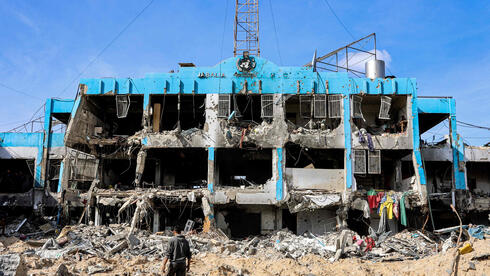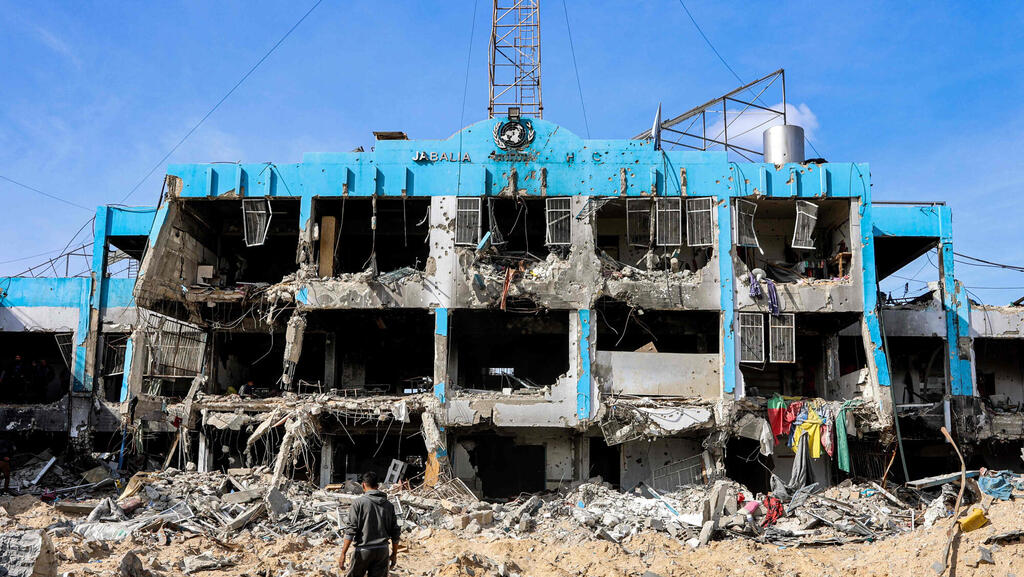
Israel bans UNRWA operations, but banks hesitate to pull the plug
With no clear legal directive, financial institutions delay account freezes despite the new law.
At the end of last week, the law to terminate the activities of UNRWA (the United Nations Relief and Works Agency for Palestine Refugees in the Near East) in Israel went into effect. In fact, there are two laws: one prohibits the organization's activities in Israel due to its alleged connections to the October 7 massacre. The second law prohibits state authorities and public bodies from having any contact with UNRWA or its representatives. This also applies to banks, with the intention that Israeli banks will block UNRWA accounts and prevent it from operating financially in Israel—a step with significant economic implications that would, for example, prevent the payment of salaries to UNRWA employees or suppliers in Israel.
The law was enacted last October, with a three-month preparation period, but during that time, banks have not changed their practices. It seems the responsibility of blocking bank accounts is being passed from one entity to another, with no one willing to take decisive action.
The Bank of Israel has not acted
Banks argue that the current wording of the law, which prohibits public bodies from contacting UNRWA, is insufficient. "Blocking a bank account is a significant step that exposes the bank to legal risks. The law is open to interpretation—it doesn’t explicitly state that banks must block accounts. Therefore, clear instructions are needed on what actions banks should take and what they are prohibited from doing," said a banking source.
However, the Bank of Israel has also been slow to act. MK Yulia Malinovsky (Yisrael Beiteinu), one of the law’s initiators, contacted the Bank of Israel in November, asking for clarification on how banks were preparing to implement the law. She noted, "Although the law focuses on prohibiting contact between government officials and UNRWA, I am reaching out because UNRWA holds accounts in several Israeli banks." Malinovsky emphasized that, under the new law, UNRWA would lose its authority to issue certificates or documents recognized by the state, which would significantly affect its ability to engage with the banking system. "Given the complexity and importance of the matter, I would like to know how the banking system plans to prepare for the law’s implementation."
By late November, Malinovsky received a vague response: "The banks will need to assess the law’s implications for their operations and act accordingly. If necessary, this will be reviewed by the authorities responsible for enforcing the law."
Since then, two months have passed with no clear instructions issued. Last week, Bank of Israel Governor Prof. Amir Yaron appeared before the Finance Committee to discuss the Bank of Israel’s budget, where he was asked about this issue. Yaron replied, "This is a sensitive matter. We do not manage the banks—this must be understood. The issue is still under discussion with the Ministries of Justice and Foreign Affairs. We are awaiting their legal interpretations, and once we receive them, we will act." In the meantime, while the law is in effect, it has not been fully implemented, at least from the banks’ perspective.
Harsh global criticism
UNRWA is a UN agency whose official mission is to provide humanitarian aid to Palestinians. However, during the war in Gaza, evidence emerged of connections between UNRWA employees and Hamas, including allegations that some were involved in the October 7 massacre. Additionally, testimonies from hostages who returned to Israel indicated that they had been held in UNRWA facilities or by its employees.
It’s worth noting that a year ago, Bank Leumi froze UNRWA’s account following the U.S. State Department’s decision to suspend funding to the agency due to an investigation into the potential involvement of its employees in terrorist activities. While several countries joined the U.S. in halting funding, many others continue to view UNRWA as a legitimate humanitarian organization that should not be targeted. Against the backdrop of these findings, the Knesset advanced legislation to ban UNRWA’s activities in Israel. The law passed with the support of over 90 Knesset members in October, with a three-month transition period before taking effect at the end of January.
The banking sector, citing the sensitivity of the issue, fears potential lawsuits from international entities if they independently freeze UNRWA’s accounts. Banks are therefore demanding that the state take responsibility by issuing clear, official guidelines on how to proceed.
The Bank of Israel stated: "The Bank of Israel has worked and continues to work with relevant parties, including the Ministry of Justice, the Ministry of Foreign Affairs, and the National Security Council, to obtain a legal position regarding the application of the laws to the banking system, taking into account Israel’s international obligations."














